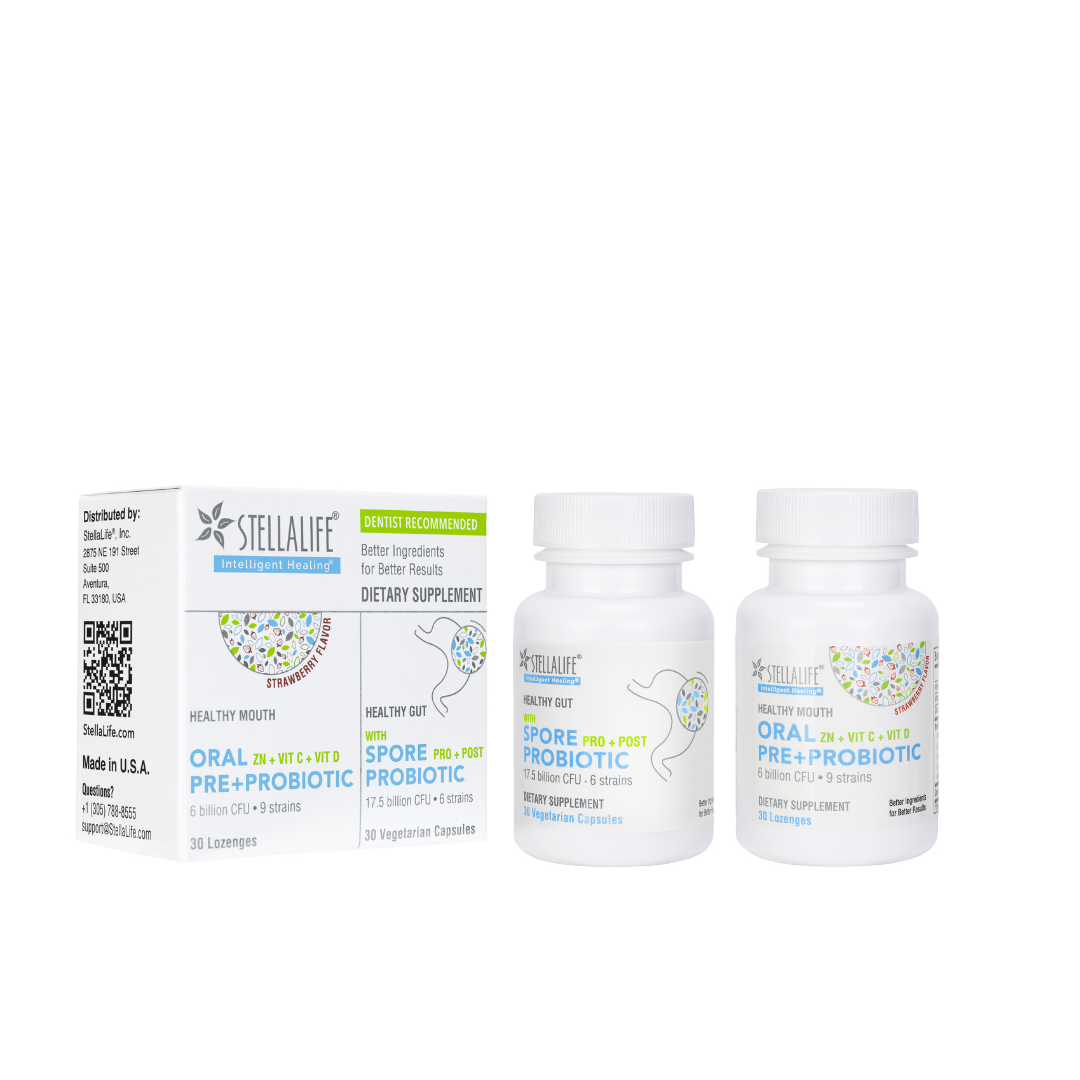Keeping an eye on our oral and digestive health is crucial for sustaining a healthy lifestyle. Did you know that oral probiotics can have a big impact on your general well-being? They can! Scientists, medical professionals, and dentists alike are learning more about the advantages of taking probiotics for gut health. With their Probiotics Kit, StellaLife® offers you the ideal blend of intestinal and oral probiotics, enhancing your health from the inside out. We’ll talk about the benefits of taking oral and intestinal probiotics together in this blog post, as well as how the StellaLife® Probiotics Kit can improve your life.
Benefits of Combining Oral and Intestinal Probiotics:
- Enhanced Oral Health:
- A healthy balance of beneficial bacteria in the mouth is encouraged by oral probiotics
- A unique formulation of pre-biotics and post-biotics provides food and an environment for good bacteria to flourish
- Probiotics provide essential vitamins and minerals
- Reduces and prevents plaque development
- Decreases the risk of bad breath and gum disease
- Better Gut Health:
- Preserving a healthy gut flora assists the digestive system
- Reduces irritable bowel syndrome (IBS) and other digestive problem symptoms
- Encourages regular bowel movements and improved gut health
- Improved Immune System:
- Mixing probiotics for the mouth and the intestines promotes a stronger immune system
- Aids in preventing dangerous bacteria and viruses
- May lower the risk of diseases and infections
- Improved Absorption of Nutrients:
- Having a healthy gut microbiome promotes better nutrient absorption
- By dissolving food particles, oral probiotics improve nutrient absorption
- Adequate nutrient assimilation supports general well-being and health
- Weight Control:
- By enhancing metabolism, gut probiotics can assist in maintaining a healthy weight
- By encouraging a balanced gut flora, one may lessen cravings for unhealthy foods
- Better digestion brought on by taking oral probiotics helps prevent weight gain and boost weight loss efforts
- Lower Allergic Symptoms:
- May reduce allergy symptoms by controlling the immune system
- Helps maintain a healthy immune system that is better able to handle allergens
- May lessen allergy-related inflammatory pain
- Improved Mental Health and Mood:
- A balanced gut microbiota is associated with better mental and behavioral health
- May help with the symptoms of anxiety and depression
- Contributes to the general function and health of the brain
Conclusion:
Combining oral and gut probiotics can significantly improve your well-being if you adopt a holistic approach to health. OralDNA® Labs’ MyPerioPath® test detects what harmful pathogens are present in the mouth. StellaLife® Probiotics help “crowd out” these harmful bacteria and replace them with good bacteria to improve overall oral and systemic health. The Probiotics Kit from StellaLife® offers a practical and efficient method to get the advantages of both oral and intestinal probiotics in one container. You’re making a prudent investment in your health by introducing the StellaLife® Probiotics Kit into your daily routine, resulting in a greater balance of healthy bacteria in your mouth and gut. The kit is the ideal supplement to your wellness journey since it promotes better oral health, increased gut function, a stronger immune system, better nutrient absorption, weight management, reduced allergy symptoms, and a beneficial impact on mental health. Don’t wait to unleash your body’s full potential; try the StellaLife® Probiotics Kit right away!
References:
Streptococcus salivarius M18 (BLIS M18®):
Tunçer, S., & Karaçam, S. (2020). Cell-free supernatant of Streptococcus salivarius M18 impairs the pathogenic properties of Pseudomonas aeruginosa and Klebsiella pneumonia. Archives of microbiology, 202(10), 2825–2840. https://doi.org/10.1007/s00203-020-02005-8
MacDonald, K. W., Chanyi, R. M., Macklaim, J. M., Cadieux, P. A., Reid, G., & Burton, J. P. (2021). Streptococcus salivarius inhibits immune activation by periodontal disease pathogens. BMC oral health, 21(1), 245. https://doi.org/10.1186/s12903-021-01606-z
Yoo, H. J., Jwa, S. K., Kim, D. H., & Ji, Y. J. (2020). Inhibitory effect of Streptococcus salivarius K12 and M18 on halitosis in vitro. Clinical and experimental dental research, 6(2), 207–214. https://doi.org/10.1002/cre2.269
Bardellini, E., Amadori, F., Gobbi, E., Ferri, A., Conti, G., & Majorana, A. (2020). Does Streptococcus Salivarius Strain M18 Assumption Make Black Stains Disappear in Children?. Oral health & preventive dentistry, 18(1), 161–164. https://doi.org/10.3290/j.ohpd.a43359
Lactobacillus casei (Lc-11®):
Manzoni, P., Mostert, M., Leonessa, M. L., Priolo, C., Farina, D., Monetti, C., Latino, M. A., & Gomirato, G. (2006). Oral supplementation with Lactobacillus casei subspecies rhamnosus prevents enteric colonization by Candida species in preterm neonates: a randomized study. Clinical infectious diseases : an official publication of the Infectious Diseases Society of America, 42(12), 1735–1742. https://doi.org/10.1086/504324
Abdul Azees, P. A., Wang, H., Chen, X. D., Yeh, C. K., & Garcia-Godoy, F. (2022). In vitro effect of an oral spray and mouthrinses on dual species cariogenic bacteria biofilm. American journal of dentistry, 35(2), 103–108. https://pubmed.ncbi.nlm.nih.gov/35506966/
Lactobacillus brevis (Lbr-35TM):
DE Sanctis, V., Belgioia, L., Cante, D., LA Porta, M. R., Caspiani, O., Guarnaccia, R., Argenone, A., Muto, P., Musio, D., DE Felice, F., Maurizi, F., Bunkhelia, F., Ruo Redda, M. G., Reali, A., Valeriani, M., Osti, M. F., Alterio, D., Bacigalupo, A., & Russi, E. G. (2019). Lactobacillus brevis CD2 for Prevention of Oral Mucositis in Patients With Head and Neck Tumors: A Multicentric Randomized Study. Anticancer research, 39(4), 1935–1942. https://doi.org/10.21873/anticanres.13303
Shah, M. P., Gujjari, S. K., & Chandrasekhar, V. S. (2017). Long-term effect of Lactobacillus brevis CD2 (Inersan®) and/or doxycycline in aggressive periodontitis. Journal of Indian Society of Periodontology, 21(4), 341–343. https://doi.org/10.4103/jisp.jisp_215_17
Lactobacillus reuteri:
Teughels, W., Durukan, A., Ozcelik, O., Pauwels, M., Quirynen, M., & Haytac, M. C. (2013). Clinical and microbiological effects of Lactobacillus reuteri probiotics in the treatment of chronic periodontitis: a randomized placebo-controlled study. Journal of clinical periodontology, 40(11), 1025–1035. https://doi.org/10.1111/jcpe.12155
Jørgensen, M. R., Kragelund, C., Jensen, P. Ø., Keller, M. K., & Twetman, S. (2017). Probiotic Lactobacillus reuteri has antifungal effects on oral Candida species in vitro. Journal of oral microbiology, 9(1), 1274582. https://doi.org/10.1080/20002297.2016.1274582
Lactobacillus rhamnosus:
Jiang, Q., Stamatova, I., Kainulainen, V. et al. Interactions between Lactobacillus rhamnosus GG and oral micro-organisms in an in vitro biofilm model. BMC Microbiol 16, 149 (2016). https://doi.org/10.1186/s12866-016-0759-7
Lactobacillus paracasei (Lpc-37®):
de Alvarenga, J.A., de Barros, P.P., de Camargo Ribeiro, F. et al. Probiotic Effects of Lactobacillus paracasei 28.4 to Inhibit Streptococcus mutans in a Gellan-Based Formulation. Probiotics & Antimicro. Prot. 13, 506–517 (2021). https://doi.org/10.1007/s12602-020-09712-0
Bifidobacterium bifidum:
Bartosch, S., Woodmansey, E. J., Paterson, J. C., McMurdo, M. E., & Macfarlane, G. T. (2005). Microbiological effects of consuming a synbiotic containing Bifidobacterium bifidum, Bifidobacterium lactis, and oligofructose in elderly persons, determined by real-time polymerase chain reaction and counting of viable bacteria. Clinical infectious diseases : an official publication of the Infectious Diseases Society of America, 40(1), 28–37. https://doi.org/10.1086/426027
- The Dynamic Duo: Benefits of Combining Oral and Gut Probiotics - August 11, 2023


